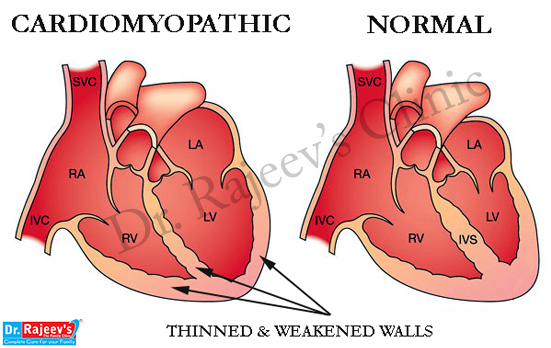

Cardiomyopathy is a progressive disease of the myocardium, or heart muscle. In most cases, the heart muscle weakens and is unable to pump blood to the rest of the body.
There are many different types of cardiomyopathy caused by a range of factors, from coronary heart disease to certain drugs. These can all lead to an irregular heartbeat, heart failure, a heart valve problem, or other complications.
Medical treatment and follow-up care are important. They can help prevent heart failure or other complications.

There are 4 types of Cardiomyopathy .
1. Dilated cardiomyopathy – This is the most common form which can occurs when our heart muscle is too weak to pump blood efficiently.The muscles stretch and become thinner which allows the chambers of our heart to expand.This is also known as enlarged heart.
2. Hypertrophic cardiomyopathy –It is due to genetic cause.It occurs when our heart walls thicken and prevent blood from flowing through our heart. It can also be caused by long-term high blood pressure or aging.It can also be caused due to diabetes or thyroid disease.
3. Arrhythmogenic right ventricular dysplasia (ARVD)
ARVD is a very rare form of cardiomyopathy, but it is the leading cause of sudden death in young athletes. In this type of genetic cardiomyopathy, fat and extra fibrous tissue replace the muscle of the right ventricle. This causes abnormal heart rhythms.
4. Restrictive cardiomyopathy
Restrictive cardiomyopathy is the least common form. It occurs when the ventricles stiffen and can not relax enough to fill up with blood. Scarring of the heart, which frequently occurs after a heart transplant, may be a cause. It can also occur as a result of heart disease.
Other types
Most of the following types of cardiomyopathy belong to one of the previous four classifications, but each has unique causes or complications.
1. Peripartum cardiomyopathy
It occurs during or after pregnancy. This rare type occurs when the heart weakens within five months of delivery or within the final month of pregnancy. When it occurs after delivery, it’s sometimes called postpartum cardiomyopathy. This is a form of dilated cardiomyopathy, and it’s a life-threatening condition. There’s no cause.
2. Alcoholic cardiomyopathy
It is due to drinking too much alcohol over a long period of time, which can weaken our heart so it can no longer pump blood efficiently.Our heart then becomes enlarged. This is a form of dilated cardiomyopathy.
3. Ischemic cardiomyopathy
It occurs when our heart can no longer pump blood to the rest of our body due to coronary artery disease. Blood vessels to the heart muscle narrow and become blocked. This deprives the heart muscle of oxygen. Ischemic cardiomyopathy is a common cause of heart failure. Alternatively, nonischemic cardiomyopathy is any form that isn’t related to coronary artery disease.
4. Noncompaction cardiomyopathy
It is also called spongiform cardiomyopathy.It is a rare disease present at birth. It results from abnormal development of the heart muscle in the womb. Diagnosis may occur at any stage of life.
5. Pediatric cardiomyopathy.
When cardiomyopathy affects a child, it Is called pediatric cardiomyopathy.
6. Idiopathic cardiomyopathy
If cardiomyopathy is due to unknown cause, it Is called Idiopathic cardiomyopathy.
Cardiomyopathy can affect people of all ages. Major risk factors include the following:
According to research, HIV, HIV treatments, and dietary and lifestyle factors can also increase risk of cardiomyopathy. HIV can increase the risk of heart failure and dilated cardiomyopathy, in particular. If one have HIV, he/she must have regular tests to check the health of their heart. They should also follow a heart-healthy diet and exercise program.
The symptoms of all types of cardiomyopathy tend to be similar. In all cases, the heart can’t adequately pump blood to the tissues and organs of the body. It can result in symptoms such as:
Treatment varies depending on how damaged the heart is due to cardiomyopathy and the resulting symptoms.
Some people may not require treatment until symptoms appear. Others who are beginning to struggle with breathlessness or chest pain may need to make some lifestyle adjustments or take medications.
Cardiomyopathy can be control by following :
Aurum metallicum : Useful for cardiomyopathy with weakness in the muscles of the heart.
Aconite : It is useful when a person is having a heart attack.
Spigelia : It is usefull when person having irregular heartbeats which may cause sharp pain in the chest.
Cactus grandiflorus : It is useful in treating angina pectoris, which is characterized by symptoms of pain caused by decreased blood flow to the heart.
Crataegus oxyacantha : This is useful in treating coronary insufficiency in people. This disorder cause problem in a heartbeat.
Digitalis : It is useful in treating cardiac muscle failure. This disorder causes palpitation, tightness in the heart muscles, and a suffocating sensation.
RL 29